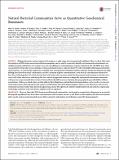Natural Bacterial Communities Serve as Quantitative Geochemical Biosensors
Author(s)
Smith, Mark Burnham; Smillie, Chris S.; Olesen, Scott Wilder; Preheim, Sarah P.; Sanders, Matthew C.; Yang, Joy Y.; Alm, Eric J.; ... Show more Show less
DownloadSmith-2015-Natural bacterial co.pdf (1.779Mb)
PUBLISHER_CC
Publisher with Creative Commons License
Creative Commons Attribution
Terms of use
Metadata
Show full item recordAbstract
Biological sensors can be engineered to measure a wide range of environmental conditions. Here we show that statistical analysis of DNA from natural microbial communities can be used to accurately identify environmental contaminants, including uranium and nitrate at a nuclear waste site. In addition to contamination, sequence data from the 16S rRNA gene alone can quantitatively predict a rich catalogue of 26 geochemical features collected from 93 wells with highly differing geochemistry characteristics. We extend this approach to identify sites contaminated with hydrocarbons from the Deepwater Horizon oil spill, finding that altered bacterial communities encode a memory of prior contamination, even after the contaminants themselves have been fully degraded. We show that the bacterial strains that are most useful for detecting oil and uranium are known to interact with these substrates, indicating that this statistical approach uncovers ecologically meaningful interactions consistent with previous experimental observations. Future efforts should focus on evaluating the geographical generalizability of these associations. Taken as a whole, these results indicate that ubiquitous, natural bacterial communities can be used as in situ environmental sensors that respond to and capture perturbations caused by human impacts. These in situ biosensors rely on environmental selection rather than directed engineering, and so this approach could be rapidly deployed and scaled as sequencing technology continues to become faster, simpler, and less expensive.
Date issued
2015-05Department
Massachusetts Institute of Technology. Computational and Systems Biology Program; Massachusetts Institute of Technology. Department of Biological EngineeringJournal
mBio
Publisher
American Society for Microbiology
Citation
Smith, Mark B., Andrea M. Rocha, Chris S. Smillie, Scott W. Olesen, Charles Paradis, Liyou Wu, James H. Campbell, et al. “Natural Bacterial Communities Serve as Quantitative Geochemical Biosensors.” mBio 6, no. 3 (May 12, 2015): e00326–15.
Version: Final published version
ISSN
2150-7511